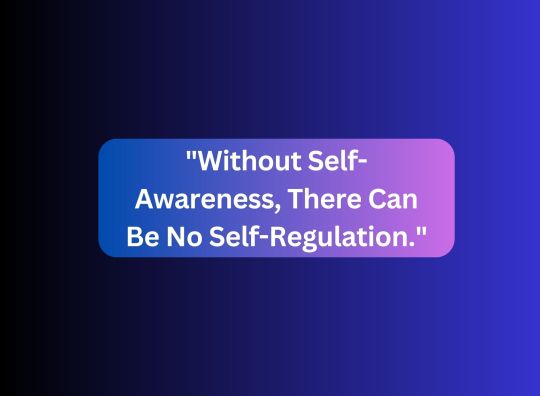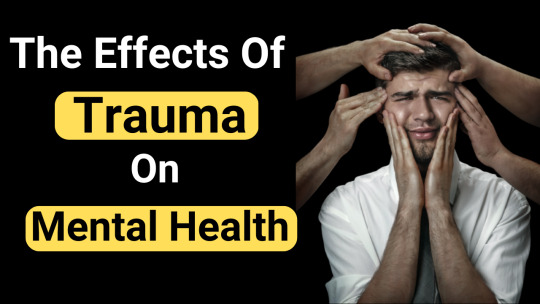Text
Why Self-Awareness Is Key To Self-Regulation🔥🔥🔥
Are you struggling to control your emotions and behaviors?
Do you want to improve your self-discipline and make better decisions?
Find out how self-awareness can be the secret weapon to self-regulation success.
Self-awareness and self-regulation are closely related psychological constructs that are important for our overall well-being and functioning. Here are ten signs that demonstrate the relationship between self-awareness and self-regulation:

You are able to recognize your own emotions:
Self-awareness involves the ability to recognize and understand our own emotions. When we are self-aware, we are able to identify our feelings and understand the causes and consequences of those feelings.
2. You are able to recognize the impact of your actions on others:
Self-awareness also involves being attuned to the effects of our actions on others. When we are self-aware, we are able to consider the perspective of others and understand the impact of our behavior on them.
3. You are able to set goals and make plans to achieve them:
Self-regulation involves the ability to set goals and make plans to achieve them. When we are self-regulating, we are able to prioritize our tasks, manage our time effectively, and take steps to achieve our goals.
4. You are able to manage your emotions effectively:
Self-regulation involves the ability to manage our emotions effectively. When we are self-regulating, we are able to recognize and acknowledge our emotions, and use strategies such as relaxation techniques or problem-solving to manage them.
5. You are able to control your impulses:
Self-regulation also involves the ability to control our impulses and make decisions that align with our values and goals. When we are self-regulating, we are able to resist temptation and make choices that are consistent with our long-term goals.
6. You are able to handle stress effectively:
Self-regulation involves the ability to handle stress effectively. When we are self-regulating, we are able to recognize and acknowledge stress, and use strategies such as relaxation techniques or problem-solving to manage it.
7. You are able to adapt to change:
Self-regulation involves the ability to adapt to change. When we are self-regulating, we are able to recognize and acknowledge change, and use strategies such as problem-solving or seeking support to manage it.
8. You are able to learn from your mistakes:
Self-regulation involves the ability to learn from our mistakes. When we are self-regulating, we are able to reflect on our mistakes, identify the causes, and use what we have learned to make improvements.
9. You are able to cope with failure:
Self-regulation also involves the ability to cope with failure. When we are self-regulating, we are able to recognize and acknowledge failure, and use strategies such as seeking support or reframing our perspective to cope with it.
10. You are able to maintain a healthy balance:
Self-regulation involves the ability to maintain a healthy balance in our lives. When we are self-regulating, we are able to prioritize our responsibilities and make time for self-care, recreation, and other activities that contribute to our well-being.
Overall, self-awareness and self-regulation are essential skills that enable us to effectively manage our emotions, thoughts, and behaviors. By developing these skills, we can improve our well-being, achieve our goals, and lead fulfilling lives.
What do you think?
I know one of these got you mad. There’s at least one thing on my list you fully disagree with. If so, let me have it in the comments!
Thanks for reading!
Wait a second. For more, watch the video version of this article on Youtube here
#selfimprovement#positivity#mindsetmatters#wellness#mindfulnessmatters#selfgrowth#mentalhealthmatters#empowerment#selfdiscovery#goals#selfawareness#selfregulation#personaldevelopment#meditation#emotionalintelligence#selfcontrol#wellnesswednesday#personalgrowth#successmindset#positivevibes
0 notes
Text
The Effects Of Trauma On Mental Health By Myhawktime
Trauma can have a significant impact on an individual's mental health. It can lead to a range of emotional and psychological reactions, including feelings of fear, anxiety, and depression. Some people may also experience changes in their behavior and relationships with others.
Here are 10 signs that the effects of trauma may be impacting your mental health:

Number one. Difficulty managing emotions: Trauma can cause intense emotions, such as anger, sadness, or fear. These emotions may be difficult to regulate, leading to outbursts or difficulty managing daily tasks.
Number two. Changes in behavior: Trauma can lead to changes in behavior, such as acting out or withdrawing from others. Some people may also engage in risky or self-destructive behaviors.
Number three. Changes in relationships: Trauma can affect how an individual relates to others. Some people may have difficulty trusting others or may feel isolated from friends and family.
Number four. Difficulty sleeping: Trauma can cause insomnia or nightmares, which can interfere with sleep and lead to fatigue.
Number five. Difficulty concentrating: Trauma can affect an individual's ability to concentrate, leading to difficulty with tasks that require focus and attention.
Number six. Flashbacks or intrusive thoughts: Trauma can cause flashbacks or intrusive thoughts about the traumatic event, which can be disturbing and distressing.
Number seven. Negative self-perception: Trauma can lead to negative self-perception, including feelings of guilt or self-blame.
Number eight. Changes in appetite: Trauma can affect an individual's appetite, leading to weight gain or loss.
Number nine. Physical symptoms: Trauma can cause physical symptoms, such as headaches, stomachaches, or difficulty with physical intimacy.
Number ten. Difficulty with daily tasks: Trauma can interfere with an individual's ability to manage daily tasks, such as maintaining a job or taking care of personal hygiene.
It's important to seek help if you are experiencing any of these signs. A mental health professional can help you process and heal from the trauma, and provide you with tools and strategies to manage your emotions and improve your mental health.
#mental health#trauma#childhood trauma#unhealed trauma#health#mental health treatment#how childhood trauma affects health across a lifetime#mental trauma#mental health matters#how trauma effects the brain#effects of age on trauma#mental health care#what is trauma#abuse on mental health#mental illness#mental health disorders#emotional trauma#psychological trauma#trauma treatment#healing from trauma#behavioral health#Myhawktime
1 note
·
View note
Text
You're Probably Waking Up Between 3 And 5 AM
There are many potential reasons why a person might wake up during the night, specifically between the hours of 3 and 5 AM. Here are nine possible signs that you are waking up during this time, along with some potential causes and suggestions for how to address them:
Number one. You feel tired and unrested despite getting enough sleep:
Number two. You feel anxious or stressed when you wake up:
Number three. You experience physical discomfort when you wake up:
Number four. You have difficulty falling back asleep:
Number five. You wake up frequently throughout the night:
Number six. You experience vivid dreams or nightmares:
Number seven. You wake up feeling thirsty:
Number Eight. You have to use the bathroom frequently during the night:
Number Nine. You feel excessively hot or cold when you wake up:
#do you often wake up between 3 and 5#if you wake up between 2 and 4 am#waking up at 3am#waking up between 3 and 5 am#waking up between 3 and 5 spiritual awakening#wake up between 3 and 5#wake up between 3 and 5 am#are you waking up between 3am and 5am#if you wake up between 3 and 5 am#waking up at 3:15 am#waking up between 3 and 5#waking up between 3 and#waking up between 3 and 4 am#waking up at 4am meaning#3 am wake up and spiritual awakening#waking up at 5
0 notes
Text
These 7 Weird Things Only Genuine Empaths Can Understand
As an empath, you may have experienced a range of unique and sometimes strange behaviors and tendencies. These quirks are often a result of your heightened sensitivity to the emotions and energy of those around you. Here are seven weird things that only genuine empaths will understand:

#empaths#being an empath#7 weird things empaths do that only genuine empaths will understand#empath#empaths and narcissists#empathy#these 7 weird things only genuine empaths can understand#things only empaths can understand#empaths refuge#empath personality#empath channel#weird things empaths do#empath personality type#empath and introvert#empath and narcissist#discover empaths#empath meaning#empath extraordinary#empath exposed#super empath
2 notes
·
View notes
Text
"The Mental Health Impact of Technology: What Science Tells Us"🧠💻
There is no doubt that technology has had a significant impact on society and the way we live our daily lives. From the way we communicate with each other, to the way we access information and entertainment, technology has changed the way we interact with the world around us. However, the rapid pace of technological advancement has also had an impact on our mental health. In this article, we will explore the 10 effects of technology on mental health.

#mentalhealthawareness#technology#mindfulness#wellness#selfcare#mentalhealthmatters#mentalhealth#health#mentalhealtheducation#mentalhealthtips#digitalwellness
2 notes
·
View notes